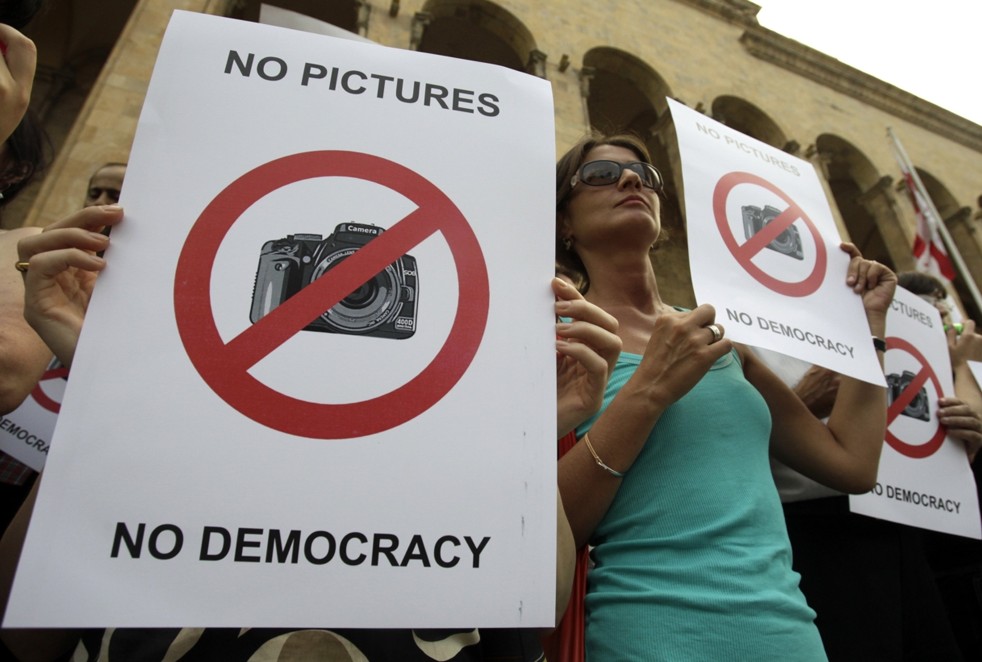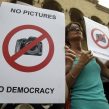
Three Photographers Charged With Espionage In Georgia
Publication: Eurasia Daily Monitor Volume: 8 Issue: 135
By:

Georgia’s official presidential photographer, another photographer who is an Internal Affairs Ministry contract employee, and the Tbilisi representative of the European Pressphoto Agency (EPA), are in pre-trial detention since July 7 on charges of espionage. On July 9 the Internal Affairs Ministry briefed the media on some of the findings in the case, pending the trial (Civil Georgia, July 9, 10; EurasiaNet, July 13).
According to that ministry’s senior counterintelligence official, Giorgi Bukhrashvili, EPA’s Tbilisi representative Zurab Kurtsikidze was in contact with Russia’s Military Intelligence Service (GRU). Tbilisi counterintelligence identified those contacts in Russia as Anatoly Sinitsyn and Sergei Okorokov, GRU officers tracked by Georgian authorities during earlier operations in the country. According to the investigation, Kurtsikidze supplied his Russian contacts with classified photographic and other materials purchased by him for money from the official presidential photographer, Irakli Gedenidze, and the interior ministry’s photographer on contract Giorgi Abdaladze. The latter had also been employed part-time by Alia, a small opposition media holding.
Searching their apartments and computers, Georgian authorities uncovered apparent samples of materials delivered or awaiting delivery, which will be submitted as evidence in the upcoming trial. According to the investigation, these include photographed documents showing a floor plan of President Mikheil Saakashvili’s residence, a schedule of the president’s appointments and itineraries of his visits in the country, according to the investigation. Details are being withheld pending the trial.
Concurrently, the authorities released audio recordings of telephone conversations between Kurtsikidze and each of the two photographers, discussing payments for services rendered – apparently, for the photographs supplied (Civil Georgia, July 10).
Also on July 9, the authorities aired on television and posted on the Internet a videotaped confession of Gedenidze, the presidential photographer. He stated that Kurtsikidze had at first solicited and purchased from him official photographs of presidential activities, presumably for the use of EPA’s Moscow bureau. After a certain period, however, Kurtsikidze requested materials relating to president Saakashvili’s residence and logistics, according to Gedenidze. He refused initially, but was threatened with disclosure of the payments already received, he said. Further according to Gedenidze, he realized at that point that he was dealing with an agent of a foreign intelligence service, but felt “blackmailed” and was “frightened” into continuing to cooperate. This confession has been released for public information, not as evidence for the forthcoming trial. For his part, Abdaladze has not made any confession and declared a hunger strike in protest against the investigation (Rustavi-2 TV, Imedi TV, July 9).
The documents alleged to have been photographed and delivered include classified documents. These form the basis for the criminal charges. Under Georgia’s criminal code, the collection, possession, and transmission of classified documents is punishable with 8 to 12 years in prison. The investigation is preparing charges of illegal possession of such documents, their transmission to the intelligence services “of a neighboring country,” and abuse of office in collecting that material in the course of working for the state. The investigative pre-trial detention is limited to two months and the trial is scheduled to start on September 1.
Moscow’s initial reaction is the predictable one of blaming Georgia for “whipping up anti-Russian hysteria,” according to Russia’s foreign ministry (Interfax, July 12). Among Georgian opposition politicians, only the Moscow-oriented Nino Burjanadze echoes this line, characterizing the Georgian investigation as an attempt to exacerbate tensions with Russia (Russia Today, July 11). Other Georgian opposition politicians are not attempting to make an issue of this case thus far.
A militant element among Georgian opposition journalists portrays this investigation as an attempt at intimidating journalists and restricting media freedom. No analysis, however, has identified any logical or operational connection between these two issues. Instead, the protesting journalists are making their case by staging street-happenings outside the Internal Affairs Ministry building. Some 20 to 30 journalists and photographers participate in this action on a quasi-daily basis, with visual images suggesting that photography is being suppressed and media freedom gagged in Georgia. As always with political protests in Georgia, these pickets also receive ample coverage on country-wide television channels (Kavkas-Press, Rustavi-2 TV, July 9-13).
This logic recalls that of the (much larger and long-lasting) opposition actions of two summers ago, when protesters built imitation prison cells in downtown Tbilisi to symbolize repression. There was not a single political prisoner in Georgia in 2009 (or since then); but props of that type apparently answer to protesters’ emotional need to transfigure political and moral reality. They insisted on spending days and nights in these imitation cells, at least in the earlier stages of the summer-long protests (before boredom prevailed and the opposition politicians hired non-political jobless men to populate these make-believe cells). The current pickets outside the Internal Affairs Ministry similarly dwell on fantasies of combating repression, albeit with a far smaller participation than the prison-cell street theater, and with a solution possible through the legal process.




